Commemoration of Boniface of Mainz, Missionary to the Germans
June 5
The Lord be with you
Today is the Commemoration of St Boniface of Mainz, Missionary to the Germans in the LC-MS. Few have had a greater impact on the history of Europe and that includes politicians, generals, and so forth. Still, today, many have no idea who he was. I am grateful that our liturgical calendar gives us the opportunity to reverse this and explore something of what God did through this man, if only I bit.
Historical Setting
To have a better understanding of Boniface it is helpful to have a bigger picture of his times, and the events leading up to them.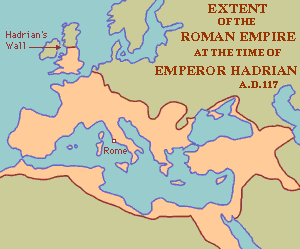
Christianity had spread in the wake of the spread of the Roman Empire. By the time of the death of Hadrian (138 AD) the Empire covered northern Africa, the Mediterranean coast of the Middle East up to the Arabian Peninsula, Turkey, sweeping around to most of modern Europe (the Scandinavian parts never fell), the Iberian Peninsula (modern Spain and Portugal) and England. Christianity was not limited by the Roman Empire, nor were all of these areas automatically open to the Christian Faith. However the Church did work hard to bring Christ to these areas.
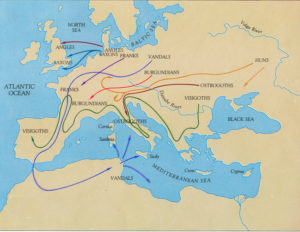 As the Middle Ages closed in, the Western half of the Roman Empire was challenged by wave after wave of barbarians. Most, after conquering, actually became Christians and established their own kingdom. Attila the Hun in the first half of the 400’s established the largest of these kingdoms and his forces took over much of modern Germany and France. The Roman Church, while surviving, was far from its grand influence of the High Middle Ages. The Popes, though, through skillful negotiations and such, kept Rome as a going concern and positioned it well for the future.
As the Middle Ages closed in, the Western half of the Roman Empire was challenged by wave after wave of barbarians. Most, after conquering, actually became Christians and established their own kingdom. Attila the Hun in the first half of the 400’s established the largest of these kingdoms and his forces took over much of modern Germany and France. The Roman Church, while surviving, was far from its grand influence of the High Middle Ages. The Popes, though, through skillful negotiations and such, kept Rome as a going concern and positioned it well for the future.
Meanwhile, on the Arabian Peninsula, Mohammed had started his new religion in the 600’s. With the sword they spread out conquering most all in their way. By about 700 they had taken over North Africa and decided to attack Europe by crossing from Tangier 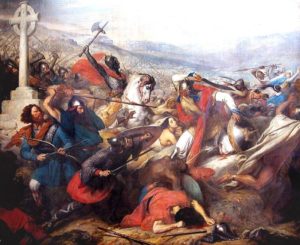 in western North Africa to the Iberian Peninsula. They met with their usual military success, conquering all of modern Portugal and almost all of Spain, and pushing into modern France. Their goal was to push on to Rome and make it another Moslem shrine. In 732 there was a key turning point when the Muslim invaders were stopped by Charles Martel, the king of the Franks.
in western North Africa to the Iberian Peninsula. They met with their usual military success, conquering all of modern Portugal and almost all of Spain, and pushing into modern France. Their goal was to push on to Rome and make it another Moslem shrine. In 732 there was a key turning point when the Muslim invaders were stopped by Charles Martel, the king of the Franks.
Elsewhere the Arab’s conquered the Persian Empire but its advance was stopped from going north and into modern Russia by the Khazars. The key turning point came in 644 in the Caucassus. This is a region between the Black Sea and the Caspian Sea. The Arabs were also blocked from attacking Europe west across Anatolia (modern Turkey) by the Byzantine Empire, also in the 600’s.
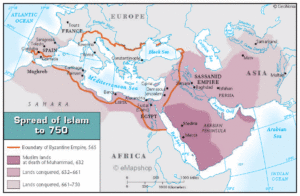 So, when Boniface was born, the Moslems were still in North Africa. Sixty years later they were stopped in their tracks by Charles Martel at Tours, just south of Paris. Charles Martel was followed by his two sons, Carloman and Pippin. After a while Carloman resigned as king of his area, giving it to Pippin, and entered a monastery. Pippin was the father of Charlemagne (742-814). The Franks were orthodox Christians. Most of those conquered by the Moslems were Arian Christians.
So, when Boniface was born, the Moslems were still in North Africa. Sixty years later they were stopped in their tracks by Charles Martel at Tours, just south of Paris. Charles Martel was followed by his two sons, Carloman and Pippin. After a while Carloman resigned as king of his area, giving it to Pippin, and entered a monastery. Pippin was the father of Charlemagne (742-814). The Franks were orthodox Christians. Most of those conquered by the Moslems were Arian Christians.
During this time, when Christian kingdoms were under assault from all sides, paganism from the Scandinavian areas spread south into the German areas. So you had areas that had remained orthodox, areas where people blended biblical faith with pagan beliefs, and areas that were completely pagan. To be quite “frank,” from a human point of view, it is very doubtful that Christianity would have survived in Europe if not for the Carolingian (Frankish) Empire. I believe that it was the hand of God himself who raised up the Franks. We do have the promise of our Lord that the Christian Church will not cease, but will last until the Second Coming.
Boniface’s Life
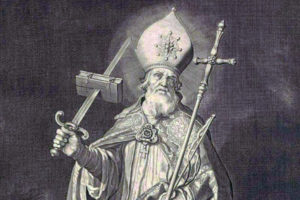 This was Boniface’s world when he was born in England, around 672 AD. He died a martyr’s death June 5, 754. The exact location of his birth is debated because the place named in the records no longer exists, though it was probably the south-western part of Wessex. Born into a well-off family, he was named Winfrid, which means “friend of peace.” The name Boniface was given to him by Pope Gregory II (Latin for “good deeds”). Boniface was quite intelligent and his dad had planned for him to enter the family business and do something important with his life, that is, make money. Boniface, though, had been deeply impressed with the missionary monks and wanted to become one. His father finally reluctantly agreed.
This was Boniface’s world when he was born in England, around 672 AD. He died a martyr’s death June 5, 754. The exact location of his birth is debated because the place named in the records no longer exists, though it was probably the south-western part of Wessex. Born into a well-off family, he was named Winfrid, which means “friend of peace.” The name Boniface was given to him by Pope Gregory II (Latin for “good deeds”). Boniface was quite intelligent and his dad had planned for him to enter the family business and do something important with his life, that is, make money. Boniface, though, had been deeply impressed with the missionary monks and wanted to become one. His father finally reluctantly agreed.
Entering a monastery, Boniface distinguished himself in scholarship and piety and his future looked safe and secure in the Benedictine Order, but he never lost his zeal for mission work. After years of pleading for a chance to preach the Gospel to the pagans in Friesland (modern Holland) his Abbot finally let him go in 716. (This happened just after Boniface refused to become the Abbot, knowing he would never get to be a missionary if he accepted the post.) Going to Friesland seemed like a good choice. The missionary work already in progress there was being led by the famous missionary monk Willibrord, so Boniface would have an excellent guide. Boniface also knew Old English, which was very similar to Old Frisian. So, full of zeal, Boniface set off. When he arrived he discovered that Radbod, king of the Frisians, had declared war on all Christians. Charles Martel had come to the defense of the Christians, but ultimate victory was years away and would be at the hands of his descendants. The pagans were murdering Christians, destroying churches, and anything else that seemed Christian. Though Boniface wanted to preach in the open fields, wiser heads prevailed. Frustrated, he returned to England.
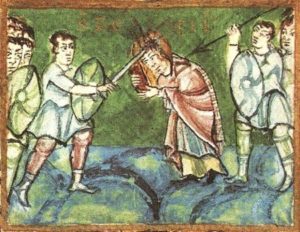 Boniface had gone on his first missionary journey without being prepared. He would not make that mistake again. In 719 he went to Rome hoping to be officially sent to Friesland to work. He did receive a papal commission, but to work in Germany (this is also when Winfrid became Boniface). In Germany he devoted himself to starting, organizing, and reforming churches and monasteries in Hesse, Thuringia, and Bavaria. Some of these areas had completely reverted to paganism and others had never been converted, while still others had remained in good shape. After becoming an archbishop, Boniface was assigned to the See of Mainz in 743. Thousands came to Christ through his efforts, and thousands more returned to the Christian Faith. Ten years after becoming an archbishop Boniface resigned his position to return to mission work among the Frisians. By this time Radbod had died.
Boniface had gone on his first missionary journey without being prepared. He would not make that mistake again. In 719 he went to Rome hoping to be officially sent to Friesland to work. He did receive a papal commission, but to work in Germany (this is also when Winfrid became Boniface). In Germany he devoted himself to starting, organizing, and reforming churches and monasteries in Hesse, Thuringia, and Bavaria. Some of these areas had completely reverted to paganism and others had never been converted, while still others had remained in good shape. After becoming an archbishop, Boniface was assigned to the See of Mainz in 743. Thousands came to Christ through his efforts, and thousands more returned to the Christian Faith. Ten years after becoming an archbishop Boniface resigned his position to return to mission work among the Frisians. By this time Radbod had died.
Once again Boniface’s work was blessed with multitudes either being converted or returning to Christ. However not everyone was pleased with his work. One day, while in a field waiting for some catechumens (students learning the basics of the Christian Faith), a mob of pagans attacked him and his party. The party was ready to fight (there were about 50 of them), but Boniface reminded them that Christians were taught to overcome evil with good. Holding up a copy of the Gospels as his only defense, he was slain, along with most of the rest of his party. It is said that the pagan who killed Boniface actually drove his sword through the book and into Boniface. That is why Boniface is often depicted with a sword through a Bible. The date was June 5, 754. When the Christians returned to the site the book was found.
Boniface’s time of activity overlapped the period in which Pippin the Younger and Charlemagne reigned and his work of converting the Saxons to Christianity was seen as a boon for expansion of Frankish rule. Yet Boniface never operated as a pawn of the kingdom of the left hand. Instead, he balanced alliances among the Carolingians, Bavarian rulers, and the papacy and often consecrated bishops who were already his followers in order to keep others from meddling in ecclesiastical affairs. It is safe to say, though, that his work would not have gone as well if it had not been for his relationships with these leaders, for they offered him protection and aid. Much of his work was also furthered by help from abroad by supporters in the Church.
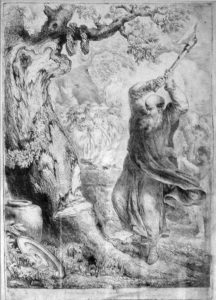 There are many stories about Boniface. Perhaps the best known is a confrontation with some pagans at the “Oak of Thor.” This was a “sacred” tree where people were sacrificed. While the Christian Faith was attracting people, they were reluctant to convert. It seems they were afraid of angering the old “gods.” Boniface, with Elijah-like overtones, challenged Thor. If Thor was a real god, he cried, let him strike me down with a bold of lightning for chopping down his tree. The locals agreed to the challenge. Boniface chopped. No thunderbolt came from the sky. According to the story, Boniface didn’t even have to finish the job himself as a mighty wind blew down the tree, as if God himself had finished the job. The pagans were convinced and became Christians. The tree itself was used to build a chapel.
There are many stories about Boniface. Perhaps the best known is a confrontation with some pagans at the “Oak of Thor.” This was a “sacred” tree where people were sacrificed. While the Christian Faith was attracting people, they were reluctant to convert. It seems they were afraid of angering the old “gods.” Boniface, with Elijah-like overtones, challenged Thor. If Thor was a real god, he cried, let him strike me down with a bold of lightning for chopping down his tree. The locals agreed to the challenge. Boniface chopped. No thunderbolt came from the sky. According to the story, Boniface didn’t even have to finish the job himself as a mighty wind blew down the tree, as if God himself had finished the job. The pagans were convinced and became Christians. The tree itself was used to build a chapel.
This also depicts one of the things people who hate to see others become Christians grip about in reference to Boniface. He destroyed pagan objects of worship. I wonder how such people would feel if they were the ones being sacrificed?
Another story of Boniface tells how he once stopped some pagans from the bloody sacrifice of a boy by blocking the death blow of a hammer with his bishop’s crook thereby splitting the hammer in two. He smacked the trunk of their ritualistic oak, and at once a powerful wind arose, ripping the tree from the ground, smashing it to pieces. Boniface then told the people of Jesus Christ, mankind’s Savior who sacrificed himself so others may live forever! Boniface pointed to a nearby fir tree and said it was a symbol of Christ, for its leaves are evergreen and pointed towards heaven. The tree was to be taken into homes, “not to shelter deeds of blood, but loving gifts and rites of kindness.” This is told about how the Christmas Tree began. It was Luther, of course, who legend says introduced Christmas Tree lights by putting candles on a fir tree in his home.
It has been said, “More than any other Christian missionary, Boniface is credited with the conversion of Germany to the Christian faith.” Now this is a man of God worth remembering.
Collect
Almighty God, you called your servant Boniface to bring your Word and Sacraments to the German people, to build up your Church among them, and to seal his ministry by martyrdom. We praise you for his life lived and laid down in your service, and we pray you to bestow on us and on all called to be missionaries an undaunted devotion to your people and to our redeemer Jesus Christ, our Lord, who lives and reigns with you and the Holy Spirit, one God, now and forever. Amen.
Blessings in Christ,
Pastor
